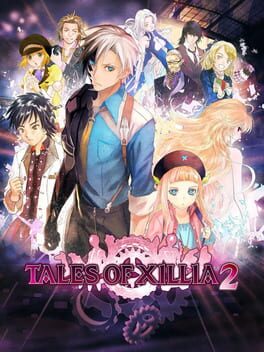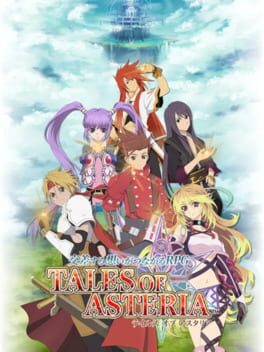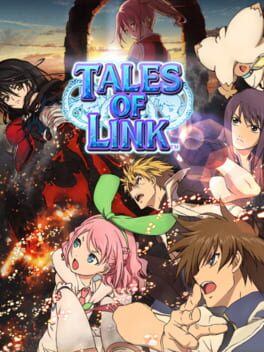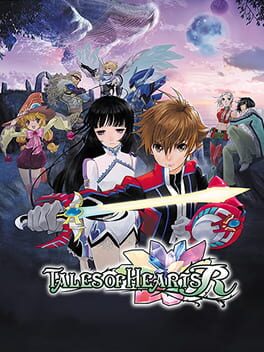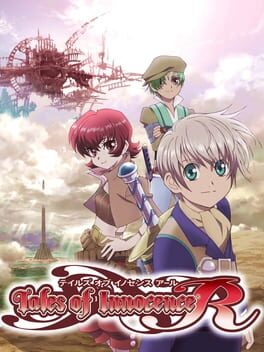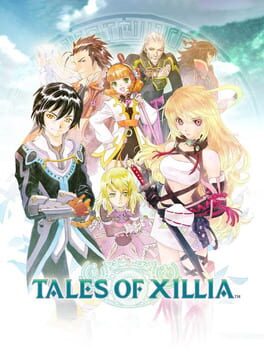

The game takes place a year after Tales of Xillia. Elle Mel Marta is given specific instructions by her father to board a train and to find the Land of Canaan. Her train is hijacked before its departure and Ludger Will Kresnik boards it to save her. The train crashes and the two receive life saving treatment from Clanspia Inc. which puts Ludger in debt. Clanspia Inc. hires Ludger, intending to use his Kresnik powers to destroy alternative timelines because the spirit Origin can no longer sustain the abundance of souls in the worlds. While working off the debt, Ludger also searches for his brother, Julius Will Kresnik, who has been blamed for the train hijacking.
Also in series
Reviews View More
After a brief hiatus from playing Tales so I could get through another couple of short games I'd been interested in (and so I could actually have the time to go pick this game up ^^;), I made it onto the sequel to Tales of Xillia. I hadn't heard a ton about Xillia 2 other than that it was very weird as both a sequel and a Tales game. I wasn't super duper game to get to it right away, but I figured what better time to play it than right after Xillia 1. It took me about 59 hours to beat the Japanese version of the game with the true ending (and that includes like 8 or so hours of mucking around in the post-game).
The story setup is kinda complicated, but I'll do my best to give a quick summary of it. Xillia 2 takes place about a year after the first game ends and follows the story of Ludgar. Having just failed his test to get into the huge company that his brother works for, he sets off for a more mundane job as a cook when he bumps into Elle, a little girl (and another important new main character). He also bumps into Jude from Xillia 1, and from there they slowly get embroiled in a big "saving the world" plot full of mysteries, murder, dimension hopping, time travel, and more or less the entire cast of Tales of Xillia 1.
Tales of Xillia 2 is a very weird game in many, many ways. For starters, Ludgar is a silent main character, and the only one in the entire mainline series of Tales games. In a game that's otherwise very much voiced, it can come across as quite uncanny as you're often talked at rather than talked to. It feels a lot less natural in the beginning of the game than as it does in the end, but it's still a very weird problem to suddenly introduce to your series. The whole reason it's introduced like that is because this game's whole stated theme is about choices, and you as Ludgar get to make choices (both important and unimportant) via the L1 and R1 buttons as those decisions come up in the story. The big theme of the game beyond just "choices" is (I would argue) the choices we make with our lives and what we'll do with them. For many characters, this means how they'll live their lives from here on out, but for many others it means how and why they'll sacrifice their lives so others may live on in their stead. Now, as an overarching theme, I don't think "radical and painful sacrifices are necessary to ensure that younger generations will even have a world to have a future in" is a bad one, but the way the game often does that via glorifying death and suicide rubbed me the wrong way, especially the way one or two characters end up dying.
Another weird thing about this game is the story and game's structure itself, which is effectively divided into three parts. First of all you have the 16 main story "episodes" (written by one person who had written for many previous Tales game), then you the Character episodes which focus on a particular party member's development and story (which were written by the person who wrote Tales of Xillia 1's story), and lastly you have the time in between those chapters which aren't locked into any kind of narrative route. Now on one hand, having clear delineations on where you are in the story can be very useful in providing the player with information on what they're currently supposed to be doing and if they're progressing the story or not via their actions. However, this also has a lot of unintended side effects on the pacing and quality of the narrative that I don't believe makes that level of player informational convenience worth it.
The main story itself is pretty well done, but it's also pretty heavily flawed. The main cast of the previous game is SO present and involved that Ludgar and Elle feel almost like fan-fiction-esque self-insert characters. It eventually feels a bit less uncanny, but at the start of the game that weird fan-fiction feeling is present almost constantly. That's even weirder when considering that Ludgar was intended to be the player's avatar, so effectively IS a self-insert but also his own character in a way that just isn't executed on very well. You do pick choices for him, sure, but not even that dialogue is voiced. It's a very deliberate choice for a silent main character and they do NOT hit the mark with it. It isn't an absolute disaster, as I eventually found Ludgar less of a stand-out than he appeared in the first third or so of the game, but I could very easily see people never feeling comfortable with how Ludgar is treated as a silent protagonist.
This all extends into further issues with the returning cast and their character episodes. This has to be the biggest if not one of the biggest main casts in a Tales main-series game. Xillia had a relatively modest main (i.e. playable) cast of six as far as more modern Tales games go, but Xillia 2 cranks that number up to NINE with the addition of Ludgar as well as two characters from Xillia 1 who are now playable (and in fairness, had been intended to be playable in Xillia 1 but had to be cut for time reasons). Adding in the unplayable Elle makes that an effective main cast of 10, and while Elle and Ludgar's main story is executed pretty well, the rest of the cast, even with their character episodes, feel very sidelined. Only a couple of them really feel like they have worthwhile arcs to explore, and most of them feel like treading water for the sake of being there. Granted, I still enjoyed doing all of them, but it's nonetheless not difficult for me to say that the cast really could've used some trimming down by two or three characters (or even just had an entirely new main cast all together).
Then you have the in-between parts, which are consumed by different optional miscellaneous quests (sometimes with story, often not) and the character episodes so you can earn money to pay off the massive debt you get near the start of the game. You need to pay off the debt in chunks that get bigger as the story progresses, and paying off a singular chunk to open up the next part of the main story is a pretty common way the game will gate progress a little to help pace things out. This is the part that feels the most like outright recycling of content from Xillia 1, from boss monsters to literally nearly every map in that entire game. It's all back for you to explore just like you did before so you can work toward paying off this debt. Now it isn't THAT all consuming a task, so you could earn the money and continue on your merry way pretty quickly if you were so inclined, but it adds so little to the main themes or even the plot that feels like nothing but padding put there to add to the Content of the game despite its short dev time.
Ultimately, the narrative is okay, and middling for a Tales game, but an inescapable mess. The story very clearly feels written by two different people, and especially by the two different people that wrote it. The main story being written not by a Tales of Xillia lead writer really shows in how self-contained it feels while also making a lot of the returning cast feel not that important. The character episodes being written by the writer of Tales of Xillia makes a lot of sense given JUST how heavily those tie into characters and plot beats from Xillia 1 without the necessary re-setup of those plot elements. If you hadn't played Xillia 1, the character episodes in this would feel very odd very often because of just how much they rely on your knowledge of events in the first game to give them any weight. It's a game that was made in pieces and feels like it. Those pieces are executed on well enough, but they just don't fit into a functional whole well enough. The character writing and dialogue are still as charming and well done as ever. That familiar element of a Tales game's narrative quality is absolutely still here, but the other issues it has keep it from being something very difficult to recommend to anyone who didn't already play and love Xillia 1.
The gameplay of Xillia 2 is ALSO strange on many levels compared to Xillia 1, but the narrative analysis section of this review was so long that I'll try to keep it relatively brief ^^;. In short, this game's mechanical design feels like a refutation of all of the streamlining and fat-trimming of Tales of Vesperia and Tales of Graces' formulas that Tales of Xillia 1 had done. Tons of elements from those games that had been cut or simplified such as item crafting have been re-added, while innovations such as the sphere grid-like level up system, leveling up shops, and party swapping mid-battle have been taken out. They aren't bad changes, per se, but it feels at the very least quite odd to have such a polished product as Xillia 1 followed up on by something that so deliberately walks back so much of the polishing that Xillia 1 put so much effort into.
The combat has also been altered significantly beyond no longer being able to swap party members mid-battle (or even outside of towns). Without getting in too deep, most of the changes amount to making combat significantly harder, especially boss fights. A new combat focus around enemy weaknesses and stacking those weaknesses in order to get damage multipliers changes the flow of battle significantly. This is also compounded in its complexity by how Ludgar has not one but THREE different weapons with totally different sets of arts and attacks for each as well as a super form, and that's ALL on top of Xillia 1's battle-link system still being there. This all not only makes Xillia 2 a significantly harder game than Xillia 1 (and most recent Tales games up to that point in general, I'd argue), but it also makes Ludgar easily the most powerful character in the cast. This is extra weird when you consider that this has one of the largest playable casts in a Tales game, but it also pretty explicitly disincentivizes you from trying out other characters (particularly when in so many main story and character episodes, 3/4ths of your party is locked and can't be changed). That's not to say the combat isn't fun. I had a ton of fun with the combat, which I think hits somewhere closer to Graces in terms of general difficulty and technicality, but it nonetheless makes for a very strange followup to Xillia 1 given how much more streamlined and quick-paced that game's combat is compared to this.
The presentation is very nice, but there are some unfortunate technical issues. Very much like Xillia 1, the game's art style and character designs are very nice and well done. I streamed this on Discord while I played it, and so many friends had the same surprise that this was a PS3 game with how pretty it looks. The music is also very nice, in the way Tales games so often do it. However, the pretty graphics come with a cost. Especially in the later parts of the game, the graphics just get a bit too hectic for the PS3 to handle and you get quite a lot of slowdown. This wouldn't be a huge problem if not for the fact that these frame rate dips REALLY hurt your input delay, and that can be the difference between life and death in a game with a relatively difficult late-game like this.
Verdict: Hesitantly Recommended. This game has a weird curse of being best fit for Tales of Xillia 1 fans but also being such a step down from that game that it's probably going to be disappointing for people familiar with that game. It's still a fine game, and remarkably well put together given that it's the first Tales game they made after Namco Bandai got rid of the dedicated Namco Tales Studio, but that's also kinda damning with faint praise. All of the weirdness isn't bad in and of itself, but it makes it a lot more difficult to get into and appreciate given how closely tied into yet totally divorced it is from its predecessor. If you can find it for cheap, and you've already played and enjoyed Tales of Xillia 1 like me, then this could definitely be worth your while, but if you just never got around to playing this after Xillia 1 and have other more pressing things to play, I think you're not missing out on a ton by passing this one up.
The story setup is kinda complicated, but I'll do my best to give a quick summary of it. Xillia 2 takes place about a year after the first game ends and follows the story of Ludgar. Having just failed his test to get into the huge company that his brother works for, he sets off for a more mundane job as a cook when he bumps into Elle, a little girl (and another important new main character). He also bumps into Jude from Xillia 1, and from there they slowly get embroiled in a big "saving the world" plot full of mysteries, murder, dimension hopping, time travel, and more or less the entire cast of Tales of Xillia 1.
Tales of Xillia 2 is a very weird game in many, many ways. For starters, Ludgar is a silent main character, and the only one in the entire mainline series of Tales games. In a game that's otherwise very much voiced, it can come across as quite uncanny as you're often talked at rather than talked to. It feels a lot less natural in the beginning of the game than as it does in the end, but it's still a very weird problem to suddenly introduce to your series. The whole reason it's introduced like that is because this game's whole stated theme is about choices, and you as Ludgar get to make choices (both important and unimportant) via the L1 and R1 buttons as those decisions come up in the story. The big theme of the game beyond just "choices" is (I would argue) the choices we make with our lives and what we'll do with them. For many characters, this means how they'll live their lives from here on out, but for many others it means how and why they'll sacrifice their lives so others may live on in their stead. Now, as an overarching theme, I don't think "radical and painful sacrifices are necessary to ensure that younger generations will even have a world to have a future in" is a bad one, but the way the game often does that via glorifying death and suicide rubbed me the wrong way, especially the way one or two characters end up dying.
Another weird thing about this game is the story and game's structure itself, which is effectively divided into three parts. First of all you have the 16 main story "episodes" (written by one person who had written for many previous Tales game), then you the Character episodes which focus on a particular party member's development and story (which were written by the person who wrote Tales of Xillia 1's story), and lastly you have the time in between those chapters which aren't locked into any kind of narrative route. Now on one hand, having clear delineations on where you are in the story can be very useful in providing the player with information on what they're currently supposed to be doing and if they're progressing the story or not via their actions. However, this also has a lot of unintended side effects on the pacing and quality of the narrative that I don't believe makes that level of player informational convenience worth it.
The main story itself is pretty well done, but it's also pretty heavily flawed. The main cast of the previous game is SO present and involved that Ludgar and Elle feel almost like fan-fiction-esque self-insert characters. It eventually feels a bit less uncanny, but at the start of the game that weird fan-fiction feeling is present almost constantly. That's even weirder when considering that Ludgar was intended to be the player's avatar, so effectively IS a self-insert but also his own character in a way that just isn't executed on very well. You do pick choices for him, sure, but not even that dialogue is voiced. It's a very deliberate choice for a silent main character and they do NOT hit the mark with it. It isn't an absolute disaster, as I eventually found Ludgar less of a stand-out than he appeared in the first third or so of the game, but I could very easily see people never feeling comfortable with how Ludgar is treated as a silent protagonist.
This all extends into further issues with the returning cast and their character episodes. This has to be the biggest if not one of the biggest main casts in a Tales main-series game. Xillia had a relatively modest main (i.e. playable) cast of six as far as more modern Tales games go, but Xillia 2 cranks that number up to NINE with the addition of Ludgar as well as two characters from Xillia 1 who are now playable (and in fairness, had been intended to be playable in Xillia 1 but had to be cut for time reasons). Adding in the unplayable Elle makes that an effective main cast of 10, and while Elle and Ludgar's main story is executed pretty well, the rest of the cast, even with their character episodes, feel very sidelined. Only a couple of them really feel like they have worthwhile arcs to explore, and most of them feel like treading water for the sake of being there. Granted, I still enjoyed doing all of them, but it's nonetheless not difficult for me to say that the cast really could've used some trimming down by two or three characters (or even just had an entirely new main cast all together).
Then you have the in-between parts, which are consumed by different optional miscellaneous quests (sometimes with story, often not) and the character episodes so you can earn money to pay off the massive debt you get near the start of the game. You need to pay off the debt in chunks that get bigger as the story progresses, and paying off a singular chunk to open up the next part of the main story is a pretty common way the game will gate progress a little to help pace things out. This is the part that feels the most like outright recycling of content from Xillia 1, from boss monsters to literally nearly every map in that entire game. It's all back for you to explore just like you did before so you can work toward paying off this debt. Now it isn't THAT all consuming a task, so you could earn the money and continue on your merry way pretty quickly if you were so inclined, but it adds so little to the main themes or even the plot that feels like nothing but padding put there to add to the Content of the game despite its short dev time.
Ultimately, the narrative is okay, and middling for a Tales game, but an inescapable mess. The story very clearly feels written by two different people, and especially by the two different people that wrote it. The main story being written not by a Tales of Xillia lead writer really shows in how self-contained it feels while also making a lot of the returning cast feel not that important. The character episodes being written by the writer of Tales of Xillia makes a lot of sense given JUST how heavily those tie into characters and plot beats from Xillia 1 without the necessary re-setup of those plot elements. If you hadn't played Xillia 1, the character episodes in this would feel very odd very often because of just how much they rely on your knowledge of events in the first game to give them any weight. It's a game that was made in pieces and feels like it. Those pieces are executed on well enough, but they just don't fit into a functional whole well enough. The character writing and dialogue are still as charming and well done as ever. That familiar element of a Tales game's narrative quality is absolutely still here, but the other issues it has keep it from being something very difficult to recommend to anyone who didn't already play and love Xillia 1.
The gameplay of Xillia 2 is ALSO strange on many levels compared to Xillia 1, but the narrative analysis section of this review was so long that I'll try to keep it relatively brief ^^;. In short, this game's mechanical design feels like a refutation of all of the streamlining and fat-trimming of Tales of Vesperia and Tales of Graces' formulas that Tales of Xillia 1 had done. Tons of elements from those games that had been cut or simplified such as item crafting have been re-added, while innovations such as the sphere grid-like level up system, leveling up shops, and party swapping mid-battle have been taken out. They aren't bad changes, per se, but it feels at the very least quite odd to have such a polished product as Xillia 1 followed up on by something that so deliberately walks back so much of the polishing that Xillia 1 put so much effort into.
The combat has also been altered significantly beyond no longer being able to swap party members mid-battle (or even outside of towns). Without getting in too deep, most of the changes amount to making combat significantly harder, especially boss fights. A new combat focus around enemy weaknesses and stacking those weaknesses in order to get damage multipliers changes the flow of battle significantly. This is also compounded in its complexity by how Ludgar has not one but THREE different weapons with totally different sets of arts and attacks for each as well as a super form, and that's ALL on top of Xillia 1's battle-link system still being there. This all not only makes Xillia 2 a significantly harder game than Xillia 1 (and most recent Tales games up to that point in general, I'd argue), but it also makes Ludgar easily the most powerful character in the cast. This is extra weird when you consider that this has one of the largest playable casts in a Tales game, but it also pretty explicitly disincentivizes you from trying out other characters (particularly when in so many main story and character episodes, 3/4ths of your party is locked and can't be changed). That's not to say the combat isn't fun. I had a ton of fun with the combat, which I think hits somewhere closer to Graces in terms of general difficulty and technicality, but it nonetheless makes for a very strange followup to Xillia 1 given how much more streamlined and quick-paced that game's combat is compared to this.
The presentation is very nice, but there are some unfortunate technical issues. Very much like Xillia 1, the game's art style and character designs are very nice and well done. I streamed this on Discord while I played it, and so many friends had the same surprise that this was a PS3 game with how pretty it looks. The music is also very nice, in the way Tales games so often do it. However, the pretty graphics come with a cost. Especially in the later parts of the game, the graphics just get a bit too hectic for the PS3 to handle and you get quite a lot of slowdown. This wouldn't be a huge problem if not for the fact that these frame rate dips REALLY hurt your input delay, and that can be the difference between life and death in a game with a relatively difficult late-game like this.
Verdict: Hesitantly Recommended. This game has a weird curse of being best fit for Tales of Xillia 1 fans but also being such a step down from that game that it's probably going to be disappointing for people familiar with that game. It's still a fine game, and remarkably well put together given that it's the first Tales game they made after Namco Bandai got rid of the dedicated Namco Tales Studio, but that's also kinda damning with faint praise. All of the weirdness isn't bad in and of itself, but it makes it a lot more difficult to get into and appreciate given how closely tied into yet totally divorced it is from its predecessor. If you can find it for cheap, and you've already played and enjoyed Tales of Xillia 1 like me, then this could definitely be worth your while, but if you just never got around to playing this after Xillia 1 and have other more pressing things to play, I think you're not missing out on a ton by passing this one up.
genuinely one of the most frustrating games i've ever played, story is super convoluted and the emotional beats albeit good are spoiled by the realization that they just could have made the game that good. the cast from xillia 1 seems to be set aside in favor of a lame self insert and i don't like being hit with 18 status ailments every combat. combats feel like they're DESIGNED to be annoying, unfortunately . debt mechanic sucks, though the premise was promising
I loved the story.
Okay now about the combat (that's why we play Tales, right?). The Power Hit system is a very smart mechanic. Rewarding the player for interacting with the RPG mechanics and as long as you're good enough you can totally combo a boss from full health to death in one touch. Power Hits aside, the combat is absolutely fantastic. The fighting game influence that makes Tales what it is is just oozing out with Xillia 2's combat. Sidestepping from 3D fighters, various hit states, OTGs and restands from knockdowns, side switches, moves with reverse hitboxes, fast drop like from platform fighters, Jump Cancelling from anime fighters. So much potential with combos in this game with every character, especially Ludger since he's literally Dante. Xillia 2 in my opinion is the best example of what Tales is, at least in terms of combat.
Okay now about the combat (that's why we play Tales, right?). The Power Hit system is a very smart mechanic. Rewarding the player for interacting with the RPG mechanics and as long as you're good enough you can totally combo a boss from full health to death in one touch. Power Hits aside, the combat is absolutely fantastic. The fighting game influence that makes Tales what it is is just oozing out with Xillia 2's combat. Sidestepping from 3D fighters, various hit states, OTGs and restands from knockdowns, side switches, moves with reverse hitboxes, fast drop like from platform fighters, Jump Cancelling from anime fighters. So much potential with combos in this game with every character, especially Ludger since he's literally Dante. Xillia 2 in my opinion is the best example of what Tales is, at least in terms of combat.
This game has my favorite combat system out of any game ever. Holy mother of god the amount of shit you can do in this battle system is insane. The story is so much more engaging too.
Xillia 2 improves on literally everything from Xillia 1, its also so nice to see these characters again after forming a connection with them from the first game.
The dungeons still need some work, but its no where near enough to bring this game down.
....That bad ending still haunts me T_T
Xillia 2 improves on literally everything from Xillia 1, its also so nice to see these characters again after forming a connection with them from the first game.
The dungeons still need some work, but its no where near enough to bring this game down.
....That bad ending still haunts me T_T
